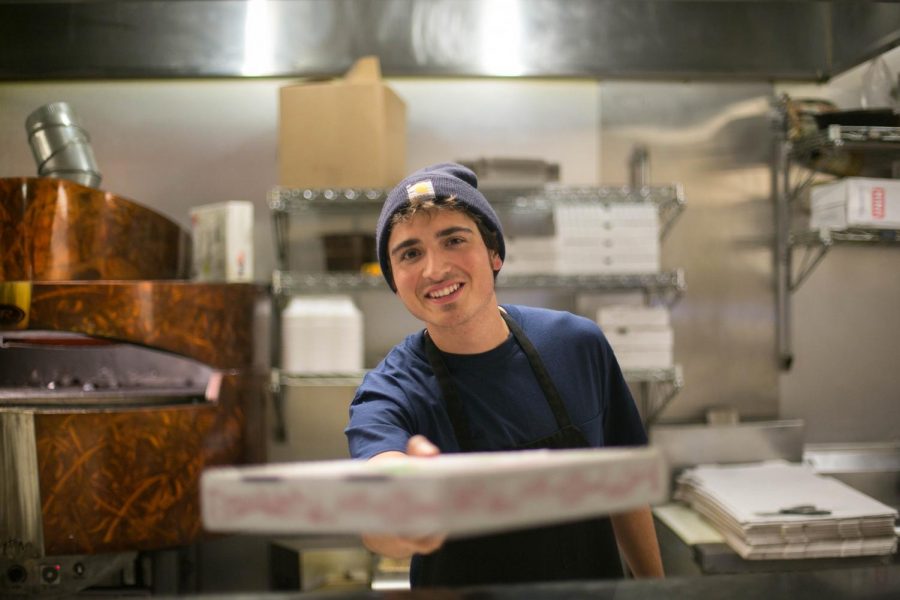Campustown restaurants give back to community with fundraisers
Zach Deliberto serving pizza at Mia Za’s on Green Street on Dec. 1, 2017. Za’s is one of many businesses who regularly partners with RSOs on campus to support certain causes.
Dec 4, 2017
If you were to walk into the Green Street Potbelly on most days between 5 p.m. and 8 p.m., you might not even know that a portion of your purchase would be going towards charity.
The restaurants that have set up shop along Green Street are fueled by the students and faculty of the University, and many decide to give back to the community that supplies their business.
Potbelly is known for having many fundraisers, as it partners with many student organizations throughout campus, including Alpha Phi Omega, Pet Net, Daily Bread, Habitat for Humanity and Illinithon.
Brad Jackson, the assistant manager at Potbelly, said what makes Potbelly different than other restaurants is that customers don’t have to mention which fundraiser they are helping with their purchase. A portion of everything purchased will automatically go to that fundraiser.
“Anyone within the community, as long as they are tax exempt, can fill out an application, and if it is approved, 25 percent of all sales from 5-8 p.m. that day go towards that organization or the organization’s cause,” Jackson said.
Get The Daily Illini in your inbox!
This year, Potbelly has given over $14,000 back to the campus community.
Additionally, they work with the Scrip Fundraising Program to raise money to benefit different nonprofit organizations. Panera Bread, Chipotle, Noodles & Co. and Panda Express also work with Scrip Fundraising.
Different restaurants have different processes through which they fundraise. For example, Latea, a bubble tea shop, does not require an application and has two different methods of fundraising.
Carmen Ho, manager at Latea, said that either they sell discounted drinks, which the student organizations buy in bulk and resell out of the store, or Latea will do in-store sales and have customers present flyers if they’re supporting the organizations.
“For example, the Asian American Association will sometimes buy in bulk and resell the teas on the Quad, and we split the difference,” Ho said.
At Chipotle, organizations can apply online and flyers are supplied by the restaurant. Fifty percent of each Chipotle order goes to the organization it is partnered with.
“Our application process is really very simple; all of the information you need to know can be found online,” said Hernan Soto, an apprentice at Chipotle.
Panera Bread also has a very similar process, as the application can be found and filled out online, and the restaurant will provide custom flyers to be distributed. Panera Bread will donate 20 percent of sales.
Given how many restaurants are located in the Campustown area, some restaurants have rules and regulations on when and how frequently fundraisers can be held.
Potbelly permits organizations to partner for one day, Monday through Thursday, from 5-8 p.m.
Latea’s fundraiser lasts for one day, all day. However, they only permit one fundraiser per week, to minimize confusion between different groups.
“We really leave it up to the organization to decide. We let the organizations decide which day they want to fundraise and all that,” Ho said.
In addition to student organizations, restaurants also often work with various fraternities and sororities on campus.
“We do a lot with Sigma Delta Phi, and we’ve found that generally, business goes up when we work with fraternities or sororities,” Jackson said. “Last year, we were able to give around $900 to a fraternity.”
Additionally, while many restaurants have fundraisers, restaurants located on campus differ in the motives behind their different partnerships. For some, fundraising is required as part of being a business, and for others, it is more personal.
“I was a student once; I was a part of different student organizations and I know how difficult expenses and finances can be,” said Ho. “I am willing to give back to a community that I can relate to.”






